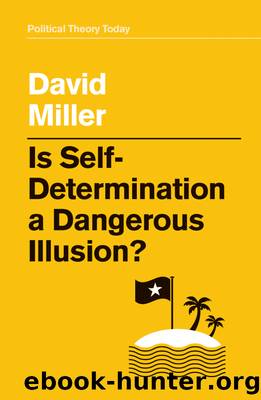Is Self-Determination a Dangerous Illusion? by David Miller

Author:David Miller [Miller, David]
Language: eng
Format: epub
Publisher: Wiley
Published: 2019-11-28T00:00:00+00:00
Notes
1 J. Waldron, ‘Two Conceptions of Self-Determination’, in S. Besson and J. Tasioulas (eds), The Philosophy of International Law (Oxford: Oxford University Press, 2010), pp. 397–413.
2 I draw here on my longer discussion of Waldron in D. Miller, ‘Neo-Kantian Theories of Self-Determination: a Critique’, Review of International Studies 42 (2016): 858–75.
3 See Waldron, ‘Two Conceptions of Self-Determination’, pp. 411–12.
4 I am simplifying the proposal here for purposes of illustration. Its proponents do not in fact advocate a unitary state but rather a complex federal arrangement in which each community is entrusted with substantial powers to organize its own collective life: see, for example, A. Burg, ‘The One State Solution’, Prospect, September 2018. Assuming this can be made to work, each community becomes partially self-determining. But there is still no significant sense in which the people of the land of Israel–Palestine could enjoy self-determination as a single people so long as they remain deeply divided ethnically and politically.
5 For an overview of the evidence, see P. Lenard and D. Miller, ‘Trust and National Identity’, in E. Uslaner (ed.), The Oxford Handbook of Social and Political Trust (Oxford: Oxford University Press, 2018).
6 I have discussed the problem of assigning collective responsibility in autocracies more fully in D. Miller, National Responsibility and Global Justice (Oxford: Oxford University Press, 2007), ch. 5.
7 See M. Setälä and G. Smith, ‘Mini-Publics and Deliberative Democracy’, in A. Bächtiger, J. Dryzek, J. Mansbridge and M. Warren (eds), The Oxford Handbook of Deliberative Democracy (Oxford: Oxford University Press, 2018); K. Grönlund, A. Bächtiger and M. Setälä (eds), Deliberative Mini-Publics: Involving Citizens in the Democratic Process (Colchester: ECPR Press, 2014).
8 See Setälä and Smith, ‘Mini-Publics and Deliberative Democracy’, p. 301.
9 See C. Lafont, ‘Deliberation, Participation, and Democratic Legitimacy: Should Deliberative Mini-publics Shape Public Policy?’, Journal of Political Philosophy 23 (2015): 40–63.
Download
This site does not store any files on its server. We only index and link to content provided by other sites. Please contact the content providers to delete copyright contents if any and email us, we'll remove relevant links or contents immediately.
| Elections & Political Process | Ideologies & Doctrines |
| International & World Politics | Political Science |
| Public Affairs & Policy | Specific Topics |
| United States |
The Secret History by Donna Tartt(19086)
The Social Justice Warrior Handbook by Lisa De Pasquale(12190)
Thirteen Reasons Why by Jay Asher(8909)
This Is How You Lose Her by Junot Diaz(6886)
Weapons of Math Destruction by Cathy O'Neil(6279)
Zero to One by Peter Thiel(5801)
Beartown by Fredrik Backman(5754)
The Myth of the Strong Leader by Archie Brown(5507)
The Fire Next Time by James Baldwin(5442)
How Democracies Die by Steven Levitsky & Daniel Ziblatt(5218)
Promise Me, Dad by Joe Biden(5153)
Stone's Rules by Roger Stone(5087)
A Higher Loyalty: Truth, Lies, and Leadership by James Comey(4961)
100 Deadly Skills by Clint Emerson(4925)
Rise and Kill First by Ronen Bergman(4788)
Secrecy World by Jake Bernstein(4753)
The David Icke Guide to the Global Conspiracy (and how to end it) by David Icke(4717)
The Farm by Tom Rob Smith(4507)
The Doomsday Machine by Daniel Ellsberg(4490)
